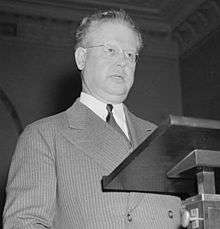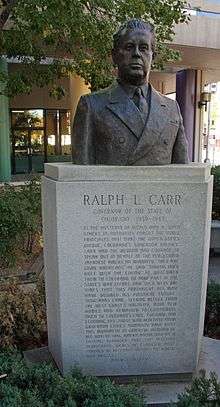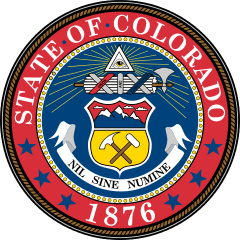Ralph Lawrence Carr
| Ralph Lawrence Carr | |
|---|---|
 | |
| 29th Governor of Colorado | |
|
In office January 10, 1939 – January 12, 1943 | |
| Lieutenant | John Charles Vivian |
| Preceded by | Teller Ammons |
| Succeeded by | John Charles Vivian |
| Personal details | |
| Born |
December 11, 1887 Rosita, Colorado |
| Died |
September 22, 1950 (aged 62) Denver, Colorado |
| Political party | Republican |
| Spouse(s) |
(1) Gretchen Fowler (2) Eleanor Fairall Howe |
| Profession | lawyer, newspaper editor |
Ralph Lawrence Carr (December 11, 1887 – September 22, 1950) was the 29th Governor of Colorado from 1939 to 1943.
Early life
Born in Rosita in Custer County, Carr grew up in Cripple Creek in Teller County, graduated from Cripple Creek High School in 1905, and earned a law degree in 1912. After more than a decade in private practice, he moved to Denver, and in 1929, President Herbert Hoover appointed him US Attorney for Colorado.
Governor
In 1938, Carr was elected governor of his home state. A conservative Republican, Carr was committed to fiscal restraint in state government and opposed the New Deal policies of President Franklin Roosevelt.
Support for Japanese Americans
Following Roosevelt's issuance of Executive Order 9066 in 1942, the War Relocation Authority decided to resettle Japanese Americans evicted from the West Coast in a camp at Amache near Granada, Colorado. Carr, by now in his second term as governor, insistently went against popular anti-Japanese sentiment and urged Coloradans to welcome the evacuees.[1] For example, in one speech to a large and hostile audience, made up primarily of worried Colorado farmers, Carr said of the evacuees:
They are not going to take over the vegetable business of this state, and they are not going to take over the Arkansas Valley. But the Japanese are protected by the same Constitution that protects us. An American citizen of Japanese descent has the same rights as any other citizen.... If you harm them, you must first harm me. I was brought up in small towns where I knew the shame and dishonor of race hatred. I grew to despise it because it threatened [pointing to various audience members] the happiness of you and you and you.[2]
Carr's urgings for racial tolerance and for protection of the constitutional rights of the Japanese Americans are generally thought to have cost him his political career. He narrowly lost the 1942 Senate election to incumbent Democratic Senator Edwin C. Johnson.
Legacy

Carr is buried in Fairmount Cemetery in Denver. In 1976, a bust of Carr was erected in Denver's Sakura Square to commemorate his efforts on behalf of Japanese-Americans.
Carr has a street named after him which runs through the western suburbs of Westminster, Arvada, Wheat Ridge, and Lakewood.
On March 14, 2008, both houses of the Colorado legislature, in a unanimous vote, named a section of U.S. Route 285 between Kenosha Pass and C-470 the "Ralph Carr Memorial Highway." [3]
On June 4, 2008, Colorado Governor Bill Ritter signed Senate Bill 206 (Shaffer & Penry/T. Carroll & Marostica) authorizing the construction of a new state judicial complex in Denver to be named the Ralph L. Carr Colorado Judicial Center, occupying the entire block between 13th and 14th Avenues and Broadway and Lincoln Street. The center is home to the Colorado State Supreme Court, as well as other major courts and legal agencies.[4][5]
On July 6, 2012, the Japanese American Citizens League decided to create a special award in his honor.[6][7]
See also
References
- ↑ "Colorado Virtual Library, a service of the Colorado State Library (n.d.). Ralph Carr: Defender of Japanese Americans". Retrieved 5 July 2015.
- ↑ Schrager, Adam. The Principled Politician: The Ralph Carr Story. Fulcrum Publishing; Golden, Colorado; 2008. Chapter 10: "Late March 1942," p. 193.
- ↑ "Colorado Capitol Journal, March 14, 2008: US Highway 285 Designated 'Ralph Carr Memorial Highway'". Retrieved 5 July 2015.
- ↑ "Visitor Guide — Ralph L. Carr Colorado Judicial Center" (PDF). Retrieved 5 July 2015.
- ↑ "Welcome to the Colorado Judicial Learning Center — Our Building: The Ralph L. Carr Colorado Judicial Center". Retrieved 5 July 2015. "Named in honor of Colorado's 29th governor, the Judicial Center serves as an accessible, welcoming, and educational meeting place for the people of Colorado."
- ↑ "Japanese American Citizens League (JACL) Annual Report 2013" (PDF). Retrieved 5 July 2015. Page 16: "During the 2013 National JACL Convention ... the Governor Ralph L. Carr Award for Courage was presented for the first time since it was created by a 2012 JACL National Council resolution in honor of Governor Ralph Carr of Colorado, who opposed the unfair incarceration and courageously defended the constitutional rights of Japanese Americans."
- ↑ "The Japan Times; July 28, 2013: U.S. officials lauded for restoring Japanese-American honor". Retrieved 5 July 2015. "A ceremony was held Friday to commend U.S. officials, including the late President Ronald Reagan, who played leading roles in restoring the honor of the Japanese-Americans interned during World War II.... This was the first presentation ceremony for the Ralph Carr Award, set up by the [Japanese-American Citizens] League last year in honor of the late Colorado governor’s fight against moves to intern them."
- Who Was Who in America, v. 3 (1951–1960), Chicago: Marquis - Who's Who, 1963, p. 140.
External links
- Governor Ralph L. Carr Collection at the Colorado State Archives
- Ralph Lawrence Carr at Find a Grave
- "A Small Voice, But a Strong Voice" - A short documentary film about Gov. Carr (here in streaming .wmv format) that won the "2006 National History Day" competition for the History Channel's Award of Excellence in Documentary Film. The film was created by Ryan Brown of the Denver School of the Arts, Denver, Colo.
| Political offices | ||
|---|---|---|
| Preceded by Teller Ammons |
Governor of Colorado 1939–1943 |
Succeeded by John Charles Vivian |
